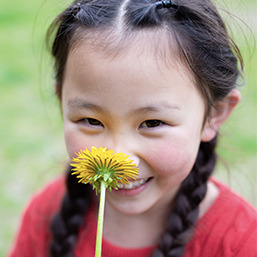
You know how hard and solid concrete is? It’s resistant, it lasts, and it’s usually very consistent. However, do you know what grows right through concrete?
Dandelions.
We’ve all seen dandelions, soft little weeds that seem to be the opposite of concrete, breaking right through our sidewalks. Nothing to it, for a dandelion. If asked which is tougher, most of us would say “concrete,” but we’d be wrong.
Children are really no different than dandelions. They are soft and flexible and are excellent at adjusting to hard things. They are adaptive. Somewhere along the line, though, many children (and adults) lose that capacity. Often, this is because they are not challenged with difficult things, or those challenges are taken care of on their behalf. Sometimes, it’s because they simply get overwhelmed by challenges. Whatever the case may be, it is possible to develop more resilience in young people.
Resiliency is the capacity to respond to stressors in healthy ways, and the ability to not quit when things get difficult. And of course, life inevitably will become difficult! So, how do we build resilience?
The American Psychological Association has some excellent tips (and remember that if it works for children, it’ll likely work for parents and teachers too!):
Make connections. Teach your child the importance of engaging and connecting with their peers, including the skill of empathy and listening to others. Even if they connect online, having social support and positive relationships goes a long way to building resilience.
Help your child by having them help others. Children who may feel helpless can feel empowered by helping others. Engage your child in age-appropriate volunteer work or ask for assistance yourself with tasks that they can master.
Maintain a daily routine. Sticking to a routine can be comforting to children, especially younger children who crave structure in their lives, particularly during times of distress or transition (though some flexibility may be necessary as situations arise).
Recognize what you can change. While some anxiety can motivate us to take positive action, we also need to validate all feelings. Teach your child how to focus on something that they can control or can act on.
Teach your child self-care. Teach your child the importance of basic self-care (taking time to eat properly, exercise, and getting sufficient sleep). Make sure your child has time to have fun and participate in the activities they enjoy.
Move towards your goals. Teach your child to set reasonable goals and help them to move towards them one step at a time. Ensure that any goals that are set include the child’s input and direction. These should be their goals, not yours.
Nurture a positive self-view. Help your child remember ways they have successfully handled hardships in the past and help them understand that these past challenges help build the strength to handle future challenges.
Keep things in perspective and maintain a hopeful outlook. Even when your child is facing very painful events, help them look at the situation in a broader context and keep a long-term perspective. Although your child may be too young to consider a long-term look on their own, help them see that there is a future beyond the current situation and that the future can be good. An optimistic and positive outlook can enable children to see the good things in life and keep going even in the hardest times.
Look for opportunities for self-discovery. Tough times are often when we tend to learn the most about ourselves. So, it is important not to give in to the desire to help your children with all of their problems. Parents need to allow for children to get messy and learn to deal with challenges – so if they don’t make the team or don’t get along with a teacher, let them (as much as possible) work through that difficulty so they can feel empowered to solve their own problems in the future.
Accept change. Help your child see that change is part of life and that new goals can replace goals that have become unattainable. It is important to examine what is going well, and to have a plan of action for what is not going well.
Resilience is one of the best predictors of positive mental wellness and encourages healthy risk-taking. It prevents anxiety and depression, and it empowers children while taking some of the pressure off parents.
Just remember, parents can always be there to support children in their sometimes-difficult path to learning resilience, but you can sometimes do the best thing by doing nothing at all! Just remember the humble little weed that can have the power to tear through concrete – it does its best work when it has solid roots.
Dr. Brent Macdonald is a frequent guest on CBC, Global Television, Breakfast Television, and CTV. He is currently the lead psychologist with Onward Psychology Group (onwardpsychology.ca), which, in addition to providing counselling and assessment services, also provides consultation services to educators and parents.
See our related articles:
Calgary’s Child Magazine © 2024 Calgary’s Child